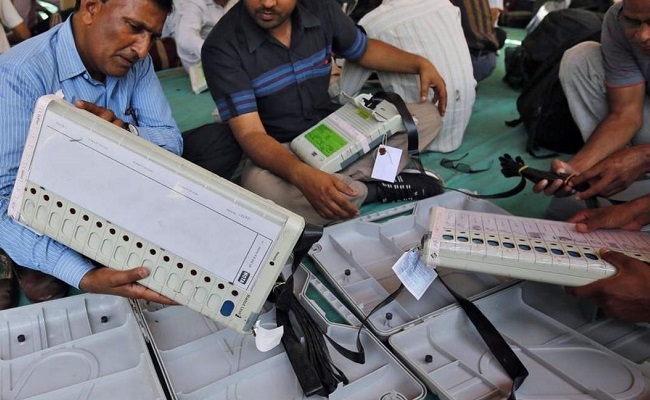 Mumbai: As the Opposition parties’ apprehensions on glitches in Electronic Voting Machines (EVMs) continue to simmer, a new spectre looms large on the vote-count day of the 2019 Lok Sabha elections, May 23.
Mumbai: As the Opposition parties’ apprehensions on glitches in Electronic Voting Machines (EVMs) continue to simmer, a new spectre looms large on the vote-count day of the 2019 Lok Sabha elections, May 23.
With the verdict of millions of voters in 2019 elections sealed inside EVMs, there are fresh fears of foul play and potential manipulations, thanks to certain alleged loopholes in the counting processes of the Election Commission of India (ECI), warns an expert on election laws.
In order to avoid this, there is a clamour that the ECI must provide a printout of the votes cast in each EVM to all candidates or their Counting Agents, which can be later tallied with the final vote-count.
In the EVMs era, for reasons best known to it, the ECI’s continues the old and faulty “manual recording and tabulation” of votes, where there is huge scope for manoeuvering, said eminent Nagpur-based lawyer Vinod Tiwari.
He has raised the issue with ECI since 2009 but accused the election body of being “reluctant to take any steps to improve the systems, which can benefit the entire electoral process”.
“The old, pre-1990, ballot-paper era style of physical counting and tabulation of the votes, is still in vogue. The Counting Supervisors on each counting table manually record, tabulate the votes displayed on the EVMs, then feed it in excel sheets with further chances of manipulations, before they are fed in computers by government officials deployed for the purpose. There is a big possibility that the final results may be at variance with the actual votes cast,” Tiwari said.
Worse is the reality of ignorant Counting Agents, appointed by various political parties, who remain blissfully unaware of such hoodwinking going on before their wide-open eyes, Tiwari said.
In the massive counting halls hired by the EC, for safety and security reasons, a strong wire mesh is erected around all the counting tables, the Counting Agents are kept at least 10-15 feet away, making it impossible to view properly what exactly is recorded on the sheets by the Counting Supervisors.
As per usual practice, from a tiny slot in the wire-mesh, the Counting Supervisors generally take the signatures of a few of the Counting Agents on the prescribed forms on the pretext of attendance before display/counting of the votes begins.
“Here, out of, say, 10 Counting Agents, the signatures of a few may be taken as a formality and the poor Counting Agents fail to gauge the significance or the gravity of their action as the signatures are obtained very casually,” said Tiwari, who has pointed this serious issue to the ECI.
Then, he claimed that the ‘vote-count games’ begin. The Counting Supervisors have no scope to change total number of votes (which is the vertical total), but they can surreptitiously “add” the votes polled by independent candidates or those standing third, fourth or fifth, in multiples of 50 or 100, to a particular candidate who has to be “favoured”, without affecting the vertical total.
In a particular booth, if the total number of votes polled is say, 786, then on display of counting of votes, all 786 are shown including NOTA, and the Counting Agents dutifully record the numbers against their candidates, plus maybe their immediate rivals, but not all the candidates.
“As the counting table is not visible from the 10-15 feet distance and the wire-mesh barrier, some Counting Supervisors can simply add up the votes hijacked from independents or other non-serious lower-ranking candidates to their particular ‘favoured’ candidate,” explained Tiwari.
“When the victory margins are very thin — which is expected in the 2019 parliamentary elections — these additions of 50-100 votes to the ‘favoured’ candidates can make or mar elections, for candidates, political parties or alliances,” he pointed out.
He said that there are many past instances of prominent candidates being “slaughtered at the counting tables” in Maharashtra and other states, while some others barely scraped through with wafer-thin margins, as pointed out many times to ECI.
In order to avoid and end such intrigues permanently, Tiwari has urged the ECI to provide a printout of the votes polled on each EVM to all Counting Agents of all candidates at the counting table itself, before starting the vote count.
The Counting Agents can later tally the printout figures with the final vote-count to ascertain whether any major errors against their candidates vis-a-vis votes cast have taken place at the counting tables.
Trade Union Joint Action Committee Convenor Vishwas Utagi terms the matter as “portending grave implications for future of Indian democracy”.
“All the political parties must immediately take up the matter with the ECI and if necessary move the Supreme Court, as a few officials cannot be allowed to play around with democracy,” Utagi told IANS.
In India, the counting of votes is governed by the Conduct of Elections Rules, 1961, under the Representation of the People Act, 1951, and though these have been amended for the EVMs era.
On March 24, 1992, the Rules {vide Notification No. S.O.230(E)} were amended to make them in tune with EVMs era, informed Tiwari, who was the Bharatiya Janata Party’s National Co-convenor and Vice-President (Legal & Legislative Cell) from 2012-2017.
“I have taken this up with the ECI repeatedly in the past ten years, but they don’t budge. It’s a sheer mystery, why — in the modern EVMs — the ECI sticks to the outdated manual practices in vote-count, and shies from upgrading to technology counting votes,” said Tiwari.
Moreover, only major political parties or serious candidates appoint Counting Agents, many independents or frivolous candidates who may secure a few hundred votes don’t even bother to send anybody to the counting centres, leaving the counting tables open grounds for deception.





